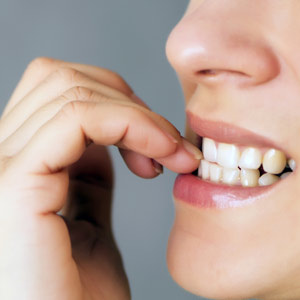 Periodontal (gum) disease is the most likely cause of a loose, permanent tooth. This progressive infection causes damage to the gums and bone tissues that hold teeth in place, leading to looseness and ultimately tooth loss.
Periodontal (gum) disease is the most likely cause of a loose, permanent tooth. This progressive infection causes damage to the gums and bone tissues that hold teeth in place, leading to looseness and ultimately tooth loss.
Gum disease, however, isn’t the only cause: although not as common, excessive biting forces over time may also lead to loose teeth. The excessive force stretches the periodontal ligaments that hold teeth in place, causing the teeth to become loose.
This condition is called occlusal trauma. In its primary form, the patient habitually grinds or clenches their teeth, or bites or chews on hard objects like pencils or nails. Generating 20-30 times the normal biting force, these habits can cause considerable damage. It can also be a factor when gum disease is present — supporting bone becomes so weakened by the disease, even normal biting forces can cause mobility.
If you recognize the early signs of grinding or clenching, particularly jaw soreness in the morning (since many instances of teeth grinding occur while we sleep), it’s important to seek treatment before teeth become loose. The symptoms are usually treated directly with muscle relaxants, an occlusal guard worn to soften the force when teeth bite down, or stress management, a major trigger for teeth grinding. The sooner you address the habit, the more likely you’ll avoid its consequences.
If, however, you’re already noticing a loose tooth, treatment must then focus on preserving the tooth. Initially, the tooth may need to be splinted, physically joined to adjacent teeth to hold it in place while damaged tissues heal. In some cases, minute amounts of enamel may need to be removed from the tooth’s biting surfaces to help the tooth better absorb biting forces. Other treatments, including orthodontics and gum disease treatment, may also be included in your treatment plan.
If you notice a loose tooth, it’s critical you contact us as soon as possible for an evaluation — if you delay you increase the chances of eventually losing it. The earlier you address it, the better your chances of preserving your tooth.
If you would like more information on loose teeth, please contact Dr. Cindy Sumarauw at 801-281-3500 to schedule an appointment for a consultation. You can also learn more about this topic by reading the Dear Doctor magazine article “Loose Teeth.”

 A few days before the Oscars, Vanity Fair magazine asked Academy Awards host Neil Patrick Harris to name his most treasured possession. Was it his Tony award statuette for best leading actor in a musical? His star on the Hollywood Walk of Fame? The stethoscope he wore while playing teenaged doctor Doogie Howser on TV? No, as it turns out, the 41-year-old actor’s most treasured possession is… his wisdom teeth. Yes, you read that correctly. “Oddly, I still have my four wisdom teeth,” Harris said. “I refuse to let them go or I’ll lose my wise parts.”
A few days before the Oscars, Vanity Fair magazine asked Academy Awards host Neil Patrick Harris to name his most treasured possession. Was it his Tony award statuette for best leading actor in a musical? His star on the Hollywood Walk of Fame? The stethoscope he wore while playing teenaged doctor Doogie Howser on TV? No, as it turns out, the 41-year-old actor’s most treasured possession is… his wisdom teeth. Yes, you read that correctly. “Oddly, I still have my four wisdom teeth,” Harris said. “I refuse to let them go or I’ll lose my wise parts.”